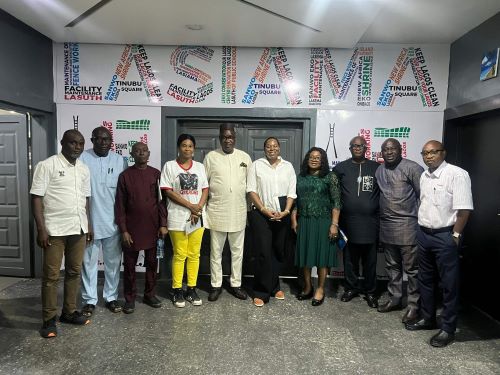The Lagos State Infrastructure Asset Management Agency has hosted a delegation from the Akwa Ibom State Infrastructure and Assets Management and Maintenance Agency for knowledge sharing in assets management.
This was revealed in a press release signed and issued by the Director of Public Affairs Unit, LASIAMA, Rasak Musbau, on Tuesday.
Musbau disclosed that the visit was part of AISAMMA’s efforts to learn from LASIAMA’s extensive experience in managing infrastructure assets, as it seeks to develop a similar framework for managing public assets in Akwa Ibom State.
Adenike Adekanbi, LASIAMA General Manager, expressed her agency’s pride in hosting the Akwa Ibom State team, emphasising the value of such exchanges in strengthening both agencies’ operations.

Adekanbi said: “We are honoured that you have chosen LASIAMA as part of your familiarisation process.
“We are confident that the insights shared today will be valuable as you work to develop and manage infrastructure assets in Akwa Ibom.”
Also Read:
- ACAOSA ’87 set celebrates 2nd reunion meeting in style
- Supreme Court affirms AGF’s consent before monetary judgment enforcement against government agencies
- Group makes case for people with dementia
- Minister commissions Abraka-Oben road rebuilt by NDDC
- Okpebholo connects more communities in Edo Central, inspects 36 km new road
The statement said that over the years, LASIAMA has built a solid foundation in managing Lagos’ diverse and vast infrastructure.
Adekanbi outlined how LASIAMA’s approach to infrastructure asset management has evolved, starting with the creation of a comprehensive asset register in 2012 under the administration of former Governor Babatunde Raji Fashola.
The register, she explained, meets international standards and it is something that could help the state with credit ratings and securing loans.
One of LASIAMA’s key strategies is to develop a consistent approach to asset management across all Ministries, Departments, and Agencies in Lagos State.
A crucial part of the agency’s work is conducting regular condition assessments of assets, and prioritising maintenance for critical facilities such as health centres, schools, and government buildings.
“We ensure that facilities are at least 80 percent efficient before they are handed over to Facility Management companies for ongoing maintenance,” Adekanbi explained, adding: “This reduces the financial burden on the state, as we bring assets up to an efficient standard before facility managers take over.”
The statement indicated that LASIAMA is mandated to conduct condition assessments every four years, hence Adekanbi acknowledged that funding constraints sometimes result in assessments being carried out on a more ad-hoc basis.
However, she noted that once Facility Managers are on-site, the agency ensures that continuous monitoring and inspections are carried out to maintain the efficiency of the facilities.
The LASIAMA Head stated: “We do not carry out direct labour ourselves.
“Instead, we outsource to Facility Management companies, ensuring that they are well-equipped to maintain assets at optimal capacity.
“We also approve and register Facility Managers, supervising all aspects of facility maintenance to ensure accountability and quality.”
The Akwa Ibom State team was led by the Executive Chairman of AISAMMA, who, along with three other board members, is seeking to learn from LASIAMA’s success in the field.
AISAMMA Executive Chairman, Elder Udo Sam Umuatan, said the Agency was created by law in Akwa Ibom State in February 2024 and its Board was inaugurated in June 2024.
The agency’s primary objective, according to him, is to oversee the preservation and management of public assets owned or controlled by the state.
“Our goal is to ensure sustainability, efficiency, and accountability in the management of Akwa Ibom’s infrastructure assets,” the Executive Chairman of AISAMMA stated during the visit, adding: Given LASIAMA’s track record, we are here to explore ways we can implement similar systems and processes in our state.”
The agency’s spokesman announced that the visit to LASIAMA marks an important milestone in strengthening the relationship between Lagos and Akwa Ibom States in the area of infrastructure management, adding that as part of the familiarisation process, the Akwa Ibom State delegation also visited Revenue House, a key building in Lagos State managed by a Facility Management company, ACME.
The delegation, Musbau revealed, had a tour of the building and was briefed on the operations and role of the FM in maintaining the property.
The agency’s spokesman confirmed that the collaboration between LASIAMA and AISAMMA highlights the growing commitment of both States to improving infrastructure management and ensuring that public assets remain sustainable, efficient, and well-maintained for the benefit of citizens.
Similarly, he stressed that the visit underscored the importance of knowledge sharing between states as they seek to adopt best practices in managing public infrastructure, paving the way for more effective and accountable governance in the years to come.


